Are you tired of the nightly symphony of snoring disrupting your sleep, yet find earplugs uncomfortable or ineffective? There are alternatives.
This article will detail how to block out snoring without earplugs by utilizing sound strategies and creating a conducive sleep environment, so the rest you need isn’t just a dream.
Key Takeaways
-
White noise machines and apps can effectively mask snoring by producing soothing sounds that create a tranquil sleep environment, including natural sounds like rain or ocean waves.
-
There are specialized headphones and earbuds available, such as SleepPhones and noise-cancelling models, designed to be worn comfortably during sleep to block out snoring noises without earplugs.
-
Soundproofing your sleep space with pillows, bedding, room acoustics improvements, and sound barriers can physically reduce noise, while healthy lifestyle changes and hydration can minimize snoring at its source.
Harnessing White Noise for Serenity
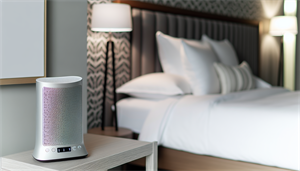
Imagine a gentle hum that drowns out the harsh snoring. This is the magic of white noise - a soft, steady sound that blankets over unwanted noises, creating a tranquil environment perfect for sleep. This can be compared to dimming the volume of your partner’s snoring or the surrounding noise, easing your path to deep, restful sleep.
The Magic of White Noise Machines
White noise machines are the wizards of sleep. They produce a gentle, soothing sound that can effectively drown out the disruptive snoring noise. Brands like LectroFan and Marpac Zohne are popular choices, with their range of sounds and volume controls allowing you to customize your sleep environment to your preference.
Imagine lying down to sleep, enveloped in the calming sound of ocean waves or a gentle fan, with the loud snoring noise fading into the background. Now, that’s a spell for a peaceful night!
White Noise Apps: Your Smartphone's Sleep Aid
In the digital age, your smartphone can be your sleep aid. White Noise App is a popular choice, offering a range of calming sounds to mask snoring. You can think of it as carrying a portable white noise machine in your pocket, always ready to soothe you into sleep wherever you might be.
From the soft pitter-patter of rain to the soothing sounds of a forest at night, these apps can create a peaceful sleep environment at the tap of a button.
The Soothing Sounds of Nature
Nature has its own symphony of sounds that can create a tranquil sleeping environment. Some examples include:
-
The rhythmic patter of rain
-
The gentle crash of ocean waves
-
The calming sounds of a thunderstorm
-
The gentle lullaby of a forest at night
These sounds can mask the sound of snoring, allowing you to drift off into a peaceful sleep. Just imagine falling asleep to the soothing sounds of nature.
This scenario can be equated to escaping from the noise in your bedroom and retreating into a serene sanctuary.
Alternative Headphone Solutions
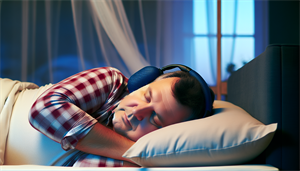
Headphones can be your silent allies in the battle against snoring. From sleep-friendly headphones specifically designed for comfort during sleep to noise-cancelling headphones that provide a quiet retreat, the right pair can make a world of difference in blocking out snoring noise.
Sleep-Friendly Headphones
SleepPhones AcousticSheep Classic Headphones are a popular sleep-friendly option. These headphones are designed with a soft, comfortable band that fits snugly around your head, making them perfect for side sleepers or restless movers.
Imagine being cocooned in your favorite relaxing music or soothing sleep sounds, with the noise of snoring fading into the background. Now that’s a recipe for a good night’s sleep!
Noise Cancelling Headphones: A Silent Retreat
Noise-cancelling headphones, like the Bose QuietComfort 35, provide a silent retreat from the noise around you. With advanced noise cancellation technology, these headphones can effectively block out snoring sounds, making them a great solution for those sharing their sleep space with a snorer.
Imagine immersing yourself in your favorite calming music or sleep sounds, with the outside noise disappearing into silence. This can be likened to creating your own personal soundproof bubble.
Bedtime Earbuds: Discreet and Comfortable
For those seeking a more discreet solution, foam earplugs or bedtime earbuds such as Anker Soundcore Sleepbuds can be a great option. These earbuds are specifically designed to fit comfortably in your ear while you sleep, providing effective noise reduction without the bulk of traditional headphones.
Consider it as having an individual sound barrier that keeps the snoring noise at a distance while you peacefully drift into sleep.
Soundproofing Your Sleep Space
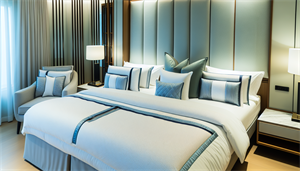
Another approach to achieving quieter nights is soundproofing your sleep space. This involves making modifications to your room to reduce the level of noise that enters it. Here are some ways to create a quieter sleep environment:
-
Use pillows and bedding to absorb sound
-
Improve room acoustics by adding rugs or curtains
-
Invest in a sound barrier, such as a white noise machine or earplugs
By implementing these strategies, you can create a more peaceful and restful sleep environment.
Cushioning Against Noise: Pillows and Bedding
Pillows and bedding can serve as a physical barrier, muffling the snoring sounds. By using dense materials like memory foam, you can create a cushion against noise, helping to create a quieter sleep environment.
Consider it as constructing a cosy fortress around your sleep, shielding it from the intrusive sound of snoring.
The Role of Room Acoustics
The acoustics of your room can play a significant role in noise reduction. By making simple adjustments such as hanging sound-absorbing curtains, laying down thick rugs, or putting up wall hangings, you can significantly reduce the echo and reverberation in the room, thus reducing the snoring noise.
It can be compared to adjusting your room to the optimum frequency for sleep.
Investing in a Sound Barrier
Investing in a sound barrier like a folding screen or acoustic panels can further enhance your room’s soundproofing. These barriers work by absorbing and bouncing back sound waves, reducing the noise that reaches your sleeping area. It’s similar to erecting a shield that fends off noise intruders, guaranteeing peaceful slumber.
Lifestyle Adjustments for Quieter Nights
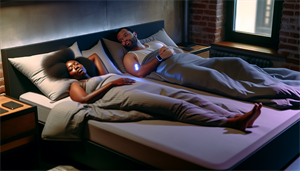
Beyond creating a tranquil sleep environment, making lifestyle adjustments can also contribute to reducing snoring. From encouraging healthy habits and optimizing sleep positions to staying hydrated, these adjustments can lead to quieter nights and improved sleep quality.
Encourage Healthy Habits
Promoting healthy habits such as weight loss, regular exercise, and avoiding alcohol can help alleviate snoring. These changes can lead to a decrease in fatty tissue in the upper airways and a reduction in the severity of obstructive sleep apnea, both of which contribute to snoring.
This involves prioritizing your health, not solely for improved sleep, but for holistic wellness.
Optimizing Sleep Positions
Your sleep position can greatly influence your snoring habits, especially for someone who snores. Encouraging side sleeping can help keep airways open, reducing both the frequency and intensity of snoring. In fact, snoring wakes can be significantly minimized by adopting this sleep position.
This is akin to discovering the perfect sleeping position for a peaceful slumber.
The Importance of Hydration
Staying hydrated is another simple yet effective way to reduce snoring. Hydration can prevent snoring caused by dry air, reducing mucus buildup, and promoting drainage.
This involves satisfying your body’s need for enough sleep, which helps in avoiding sleep deprivation and becoming sleep deprived.
Technological Aids for Sleeping Partner's Peace
In the age of technology, there are numerous aids designed to improve sleep quality and reduce snoring. These include smart beds, sleep wearables, and sleep-promoting apps.
These tools can help both partners sleep better, regardless of a snoring partner.
Smart Beds and Sleep Monitors
Smart beds and sleep monitors can provide valuable insights into your sleep patterns. They track your sleep data and offer personalized recommendations for improvement, paving the way for better, snore-free nights.
You can think of it as having a personal sleep mentor directing you towards improved sleep.
The Use of Sleep-Assisting Wearables
Sleep-assisting wearables, such as anti-snoring devices and nasal strips, can help keep your airways open and reduce snoring. These wearable devices offer a practical and non-invasive solution to snoring, ensuring a quiet night for you and your partner.
Apps That Promote Deep Sleep
Sleep-promoting apps, like Calm and Headspace, can help create a relaxing bedtime routine. These apps offer a variety of calming content, such as guided meditations and relaxing sounds, that can help you wind down and prepare for a restful night’s sleep.
Cultivating a Calming Pre-Sleep Routine
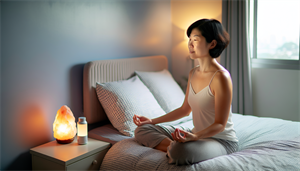
Cultivating a calming pre-sleep routine can set the stage for a restful night. Practices such as mindfulness, aromatherapy, and enjoying a warm bath can help relax your mind and body, making it easier to fall asleep and reducing the impact of snoring on your sleep quality.
Mindfulness and Meditation
Mindfulness and meditation techniques can help you relax before bedtime. By calming your mind and body, these practices can help you fall asleep faster and enjoy a deeper, more restful sleep.
This involves focusing on your breath, releasing the day’s stress, and relaxing your throat muscles for a serene night.
Aromatherapy and Essential Oils
Aromatherapy with essential oils, like lavender and chamomile, can create a calming sleep environment. These scents can help reduce stress and anxiety, preparing your mind and body for restful sleep.
Warm Baths and Herbal Teas
Warm baths and herbal teas can help relax your body and promote better sleep. The heat from a warm bath can help soothe tense muscles, while herbal teas can have calming effects that prepare your body for sleep.
This can be likened to ending your day enveloped in a cocoon of warmth and relaxation.
Summary
In summary, there’s a host of methods to block out snoring without resorting to uncomfortable earplugs. From harnessing the power of white noise and soundproofing your sleep space to adopting healthy lifestyle habits and utilizing technological aids, you can reclaim your quiet nights. Remember, a peaceful night’s sleep is not a luxury, but a necessity for your well-being. So, take the leap and make these changes for a snore-free future.
Frequently Asked Questions
How do you sleep with a snorer without earplugs?
Try using white noise to mask the sound of snoring and help you sleep better without earplugs. It can be a white noise machine placed next to the bed or white noise earbuds or even a smartphone app that plays white noise.
How do you soundproof for snoring?
You can soundproof for snoring by using headphones or earplugs to block out the sound. Studies have shown that wearing earplugs can improve perceived snoring severity and sleep quality.
What is the best device to block out snoring?
Some top picks to block out snoring include earplugs and white noise machines. Try these options for a peaceful night's sleep.
How do I stop listening to someone snoring?
Try using white noise, headphones, or sleeping in a different room to block out the snoring and improve your sleep quality. Encouraging lifestyle changes in the snorer can also help. Good luck!
How does white noise help with snoring?
White noise helps with snoring by masking the sound of snoring, making it easier to relax and fall asleep.


